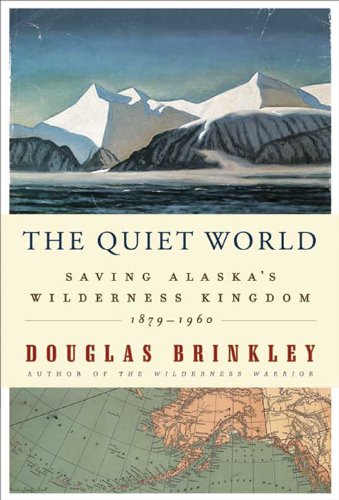 The Quiet World: Saving Alaska's Wilderness Kingdom 1879 - 1960 by Douglas Brinkley
The Quiet World: Saving Alaska's Wilderness Kingdom 1879 - 1960 by Douglas BrinkleyA riveting history of America's most beautiful natural resources, The Quiet World documents the heroic fight waged by the U.S. federal government from 1879 to 1960 to save wild Alaska -- Mount McKinley, the Tongass and Chugach national forests, Gates of the Arctic, Glacier Bay, Lake Clark, and the Coastal Plain of the Beaufort Sea, among other treasured landscapes--from extraction industries.
 The Simple Abundance: Following Your Authentic Path to Something More by Sarah Ban Breathnach
The Simple Abundance: Following Your Authentic Path to Something More by Sarah Ban BreathnachBefore Simple Abundance became a New York Times bestseller that helps millions of women discover their authentic selves, the author was running workshops that actively guided and inspired others onto the Simple Abundance path. Now Sarah recreates the heart of these workshops on the page, bringing their essence to women everywhere. In twelve chapters, one for every month, here is a whole year of soulcraft. From gratitude to play, from connecting to the sacred to facing your fears, Sarah provides thoughtful exercises, explorations, excursions and other creative, pragmatic, hands-on ways to probe your deepest feelings to reveal your authentic self.
 Scorecasting: The Hidden Influences Behind How Sports are Played and Games are Won by Tobias J. Moskowitz and L. Jon Wertheim
Scorecasting: The Hidden Influences Behind How Sports are Played and Games are Won by Tobias J. Moskowitz and L. Jon WertheimUniversity of Chicago behavioral economist Tobias Moskowitz teams up with veteran Sports Illustrated writer L. Jon Wertheim to overturn some of the most cherished truisms of sports and reveal the hidden forces that shape how basketball, baseball, football, and hockey games are played, won, and lost. Drawing from Moskowitz's original research, as well as studies from fellow economists such as bestselling author Richard Thaler, the authors look at: the influence home-field advantage has on the outcomes of the games in all sports and why it exists; the surprising truth about the universally accepted axiom that defense wins championships; the subtle biases that umpires exhibit in calling balls and strikes in key situations, and more.
No comments:
Post a Comment